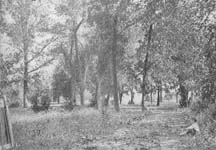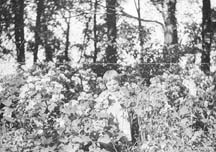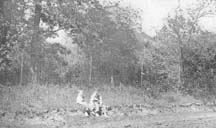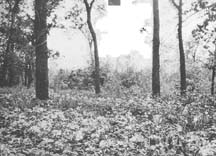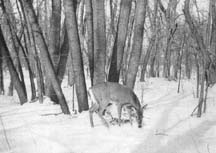WHERE THE NATURALIST LIVED
page 15
The Naturalist lived in a modest old farmhouse surrounded by beautiful trees. The house was small and unattractive, but he was more interested in birds and bees and trees and flowers than in houses. Mrs. Naturalist did not find her habitation all that might be desired, but her husband found so much joy in their surroundings that he could not contain it alone. She absorbed some of his enthusiasm and was content.
About the house there were clumps of elderberries, where the birds came to feed in the hot days of August, and mulberries where they were content to dine in cherry time. There were many wild flowers, such as asters and goldenrod, crownbeard and rudbeckia, which the neighbors regarded as weeds, but which the Naturalist guarded with jealous care. Brown thrashers and catbirds sang in the apple trees, and vireos nested in the blackberry bushes. Screech owls and flickers reared their families in the boxes which the Naturalist built for them among the trees, and wrens sang daily as they brought worms to feed their families which were growing up under the eaves of his study.
Rabbits played on the lawn in summer and ate the bark from the shrubbery in winter. Squirrels gathered the nuts from the trees before the door and scolded when the boys decided that they were entitled to a part of the harvest. Spiders were permitted to spin their webs across the open spaces in the wood without interference, for the Naturalist had built a high fence about a last remaining bit of Iowa woodland, and reserved it for the original inhabitants. No cattle or pigs were permitted to pasture there, no hunters were allowed to shoot the wild creatures that took refuge within the inclosure, and few besides the Naturalist and his boys ever intruded. In summer the undergrowth was so dense that it was with difficulty that one could force a way through. Hundreds of wild birds nested there undisturbed, wild flowers grew in profusion, and insect life was very abundant. Here the Naturalist spent many long summer days in cultivating an intimate acquaintance with the many wild creatures that lived out their lives under conditions somewhat similar to those which their ancestors had enjoyed before the white man came.
Practical people passing by were inclined to remark at the waste of good farm land growing up in such a tangle, and to chide the Naturalist because he failed to cut his weeds. However, they were not on speaking terms with the denizens of the little wood, nor did they see the beauty of the plants which to the eyes of the nature lover are anything but weeds. The Naturalist could never quite understand how people could be content to spend the long days within doors when there was so much worth while outside. Neither could he understand how they could keep so busy all day long with such practical things as cultivating their corn or hoeing their gardens when there were so many songs to be heard and so many pictures of ever-changing hue to be seen. When he worked among his bees he must stop ever and anon to watch the busy little creatures bringing in their loads of bright yellow pollen and to listen to their cheerful hum as they went about their labor. Now and again a brilliant cardinal would alight in a tree top and whistle, or a quail would call "Bob White” from a fence post, or a cicada would start his shrill call, in a way to make it very plain that life was not all intended for work on the bright summer days.
At night he would wander under trees watching the flashing of the lights of the fire-flies, and listening to the songs of the crickets and katydids, and sometimes lie down in the grass and fall off to sleep to awaken with the sun shining and the day once more at hand.
When he worked in his garden he marveled at the certainty with which the tendrils of the grape vine found the nearest support, and found much of interest in the life cycle of the cut worm which fed on his cabbages. The growing of vegetables was so much more interesting than the selling of them that he was inclined to neglect the latter phase. After all, why go to the trouble of growing things when there are so many equally interesting that will grow themselves?
Perhaps you will think that the Naturalist was an impracticable person, and so he was, from the standpoint of the man who will spend six long days at hard work in order that he may buy an automobile and go chasing madly across the country on the seventh. At any time the Naturalist could step outside his door and find a hundred things far more interesting than an automobile, and he could enjoy them for six days by working one.
In spring there was the marvelous resurrection of the bloodroots and spring beauties, violets and buttercups; the coming of the birds and awakening of the frogs. In summer there was such a riot of life on every hand that he never could quite comprehend it; ripe cherries, baby chickens, frisky lambs, butterflies and bumblebees. In autumn the apples ripened on the trees and pumpkins yellowed in the fields, while the leaves turned yellow and the nuts came down. When at last winter came and buried the dead leaves beneath a cover of snow, and the song birds had winged their way southward, he sat by his fire and dreamed of spring, while the wind moaned through the branches of the trees above his study. On sunny days he would find joy in greeting the hardy little tree sparrows and juncos in the wood, and watching the squirrels seeking for their buried nuts beneath the snow.
At any time or any season there was always much of interest to the Naturalist around his little home among the trees. Such are the conditions under which this book was written, for the Naturalist is the author, and “Our Backdoor Neighbors” are the friends that live about his door.
Next Chapter
Book Contents
Return to Bob' Page
